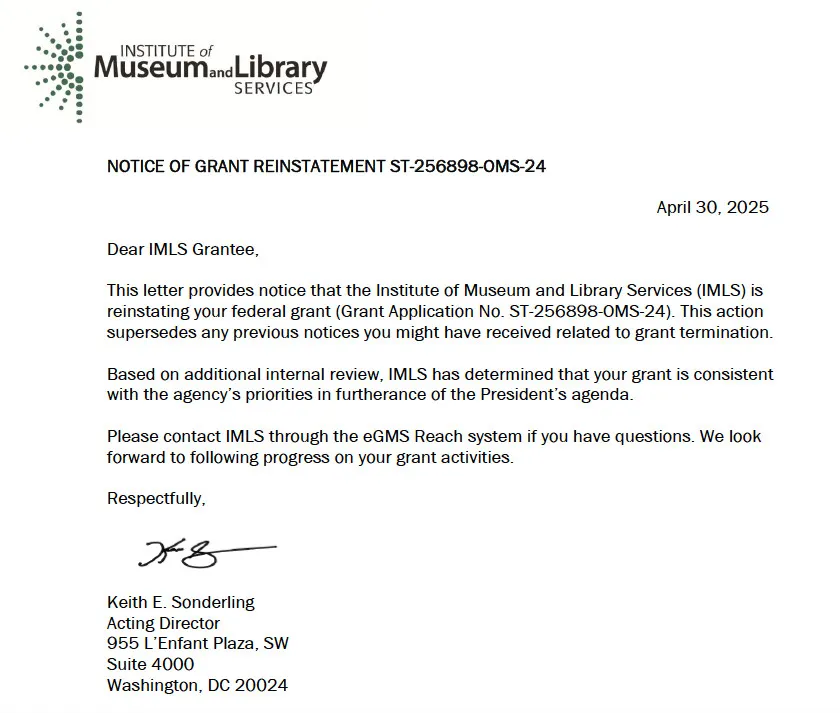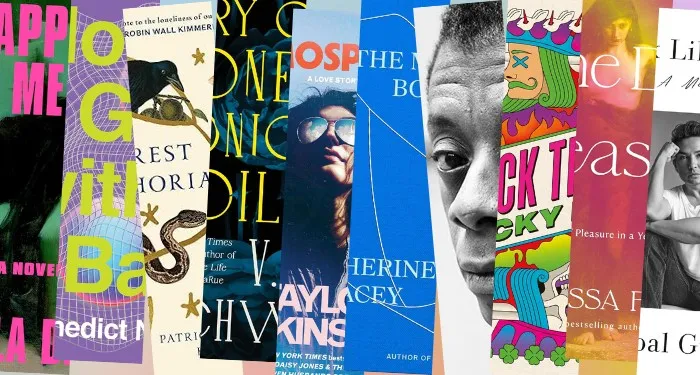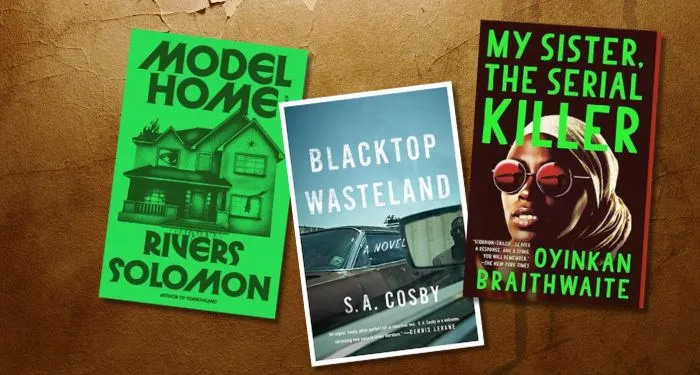Kelly is a former librarian and a long-time blogger at STACKED. She's the editor/author of (DON'T) CALL ME CRAZY: 33 VOICES START THE CONVERSATION ABOUT MENTAL HEALTH and the editor/author of HERE WE ARE: FEMINISM FOR THE REAL WORLD. Her next book, BODY TALK, will publish in Fall 2020. Follow her on Instagram @heykellyjensen.
It’s been a month and a half since the Institute for Museum and Library Services (IMLS) was ransacked by the Department of Government Efficiency. In that time, the only government agency dedicated to public libraries and museums has been turned into a propaganda machine, with a distinct focus on where and how the agency will become a leading vehicle in this administration’s plans for America 250. IMLS staff members were fired and funding for libraries nationwide was revoked. It was a complete gutting.
Two different lawsuits were quickly filed against the administration for these cuts. The first, Rhode Island vs. Trump, came from 21 state attorneys general. The second, ALA vs Sonderling, came from the American Library Association and AFSCME, the largest public employee union in the US. The first case had a motion hearing in late April, with the judge expressing a frustration with a lack of evidence provided by the defendants. The second case had its motion hearing May 1, and Judge Richard J. Leon (appointed by George W. Bush) granted a temporary restraining order in the case. That ruling means there’s a temporary halt in further dismantling of IMLS. Both the plaintiffs and defendant in that case are to file a a status report by today, May 6, in order for the case to continue forward.
The temporary restraining order was sought as a last minute effort to pause what would have been a further firing of the barebones IMLS staff on May 4. While it does not save the agency as a whole, nor does the judgment change the fact that grants provided by the IMLS were revoked–including wholesale removal of Grants to States in California, Connecticut, and Washington, thanks to their grant applications mentioning the words diversity and equity–the decision was a dose of positive news amid a series of blows for libraries nationwide. The judge sent further encouraging signals for the plaintiffs, suggesting that the administration is violating the Administrative Procedures Act.
The next day saw more bad news.
The President released his proposed budget for fiscal year 2026, which would begin October 1, 2025. That proposal includes a total annihilation of the budget for the IMLS. This is the only federal agency for libraries, and without a budget, not only would vital services at the state and local level be disrupted or outright eliminated–funds for interlibrary loan services, research databases, digital media access, and others granted by the IMLS flow to state libraries, which distribute that money to public libraries statewide–tribal, prison, and hospital libraries services may have little or no operating budgets at all.
Literary Activism
News you can use plus tips and tools for the fight against censorship and other bookish activism!
Beyond the unquestionable damage this would do to public libraries and museums, with special pain for rural areas of the country, it also begs the question of where and how the information current Acting Director of the IMLS Keith Sonderling is seeking from state libraries will be used. In an email that went out to all state libraries in late April, Sonderling demanded three pieces of information:
- What programs were being funded in the states by IMLS grants that ran counter to a host of anti-DEI executive orders published by the executive office
- How the money provided by the IMLS’s Grants to States programs were being used to “cultivate an educated and informed American citizenry.”
- How each state library planned to take part in the celebration of America’s 250th birthday next year. This piece is intimately tied to the IMLS’s new focus on being a propaganda machine, as outlined in March, and it is intimately tied to the America 250 agenda.
Agencies were to report all of this information by Monday, May 5–just days after the proposed budget eliminating IMLS was made public. If the department is up for complete annihilation, then this level of information wouldn’t be necessary. Not only does this feel like an opportunity to further perpetuate lies and disinformation about the role and purpose of libraries in the country, something that the IMLS already began to run with on their official agency Instagram account, but it also feels like a prime opportunity to cherrypick ideas for a rebranding of the Institute for Propaganda.
Since that letter arrived in state library inboxes, so, too, have letters informing individual state agencies that some of their IMLS funding has been restored by the administration. Some had previously received letters that various grant projects no longer served the needs of the administration and thus, funding was terminated (this letter was in addition to the original notice that funding was paused while the IMLS was being dismantled). Maine was able to scale back some of the layoffs the state library announced as a result of funding loss. Wisconsin announced receiving some of their grant money as well, noting that they have no idea how much of what was offered to them will actually arrive. The Library of Virginia shared the letter it received about reinstatement of their grant to digitize legislative petitions from the 18th and 19th century–a decision that came after the state library petitioned for those funds to be reinstated.
The language around that reinstatement is certainly chilling:

As noted above, while state libraries nationwide began to receive letters about cuts to their federal funding, three states were informed they’d be losing all of their funding from the Grants to States program. A source reports that at least two of those states, California and Washington, may have seen these canceled grants reinstated. No further information has been shared as of writing.
Here are but a few examples of where and how the library world has responded to the latest related to IMLS cuts. These focus on educating the public about the curtailing of vital and beloved services as much as they also encourage library supporters to show up in action. Public libraries and institutions that support them should be doing more education and calls to action and advocacy like this:
- Superior Public Library (WI) Sounds Call for Action – this is easily one of the best calls to action so far from a single public library
- Federal Cuts Threaten Program That Allows Suburban Libraries to Share Books (IL) – a powerful piece about how interlibrary loan works and what’s at stake with IMLS cuts
- The Importance of Supporting Your Local Library (MA)
- The Indiana Library Federation created a series of informational guides, including a call to action and a template letter for Hoosiers to contact their representatives about the IMLS.
Remember that libraries are not and cannot be neutral. So-called neutrality is far from the concern of those wielding partisan axes to these institutions. Libraries are unabashedly pro-library in politics, and their survival depends on advocating for their future.
Are you a library lover, advocate, or activist wondering what you can do to help protect the IMLS? Much of what you’ve been doing to help libraries on the local level works for the federal level, too:
- Write to and/or call your members of Congress and demand that the cuts to IMLS in the 2026 budget be removed. EveryLibrary makes this easy with a pre-filled template.
- Write to and/or call your state-level representatives in support of libraries and urge them to work toward maintaining or increasing state funding for public libraries. If the IMLS does not get a budget in 2026, that shortfall will need to be accounted for somewhere if services are to remain at their current level.
- When your representatives are in the community for town halls or other events, ask direct questions about whether they support the continued work of IMLS and demand to know what they’re doing to save the agency.
- If your state’s attorney general has not taken part in the lawsuit against IMLS cuts, write and urge them to do so. Most state attorney generals are elected–exceptions are Alaska, Hawaii, Maine, New Hampshire, New Jersey, Tennessee, and Wyoming–so emphasize that their responsibility is to their people.
- For those with the financial means, make a donation to your local library or other public institution whose funding comes from IMLS. This money will go directly to those organizations. Even a small donation makes an impact, as libraries have a return on investment rate of anywhere between $5 and $9 for each dollar it has.
As for the impact of IMLS funding cuts, more and more institutions have shared what’s at stake. Juneau Public Library (AK) will end its ability to share resources with rural Alaska communities, cuts to digital resources available to all Michigan residents, and the California Digital Newspaper Collection would go dark, among other tremendous losses for Americans nationwide.
The state of the IMLS and funding for libraries nationwide is an ongoing story and will continue to be updated as more information emerges. For an agency whose budget constitutes less than .004% of the federal budget, the administration has sure poured significant time, energy, and taxpayer money in creating discord and chaos within it.
The following comes to you from the Editorial Desk.
This week, we’re highlighting a post that offers you a guide to all things cozy genre books! Get to know some outstanding cozy mysteries, cozy horror, and a whole lot more. Read on for an excerpt and become an All Access member to unlock the full post.
A Guide to All the Cozy Genres
Cozy has certainly become a buzzword attached to genre fiction. It all started with cozy mysteries, which have been around for decades. Now we’re seeing cozy science fiction and fantasy, and even cozy horror. So what exactly does “cozy” mean?
There are some common traits of so-called cozy books. Generally, they evoke a charming atmosphere with their setting. In cozy mysteries, this is often a small town—think of a quaint village in the English countryside. Fantasy adds some magic to that quaint village; horror adds ghosts. For science fiction, coziness often manifests as a ship, space station, or colony with a tight-knit crew. Readers can expect rich descriptions of the setting and a lot of atmosphere for a fully transporting reading experience.
Another common factor in these books is the stakes of the story. Cozy mysteries are somewhat confounding because the crimes they solve are typically murders! Nevertheless, the reader is not subjected to gory details or put in a position of extreme suspense. Likewise, cozy fantasy and sci-fi novels may deal with the aftermath of a large-scale conflict, but the characters are likely to be dealing with smaller, more internal or interpersonal challenges.
Sign up to become an All Access member for only $6/month and then click here to read the full, unlocked article. Level up your reading life with All Access membership and explore a full library of exclusive bonus content, including must-reads, deep dives, and reading challenge recommendations.


















 English (US) ·
English (US) ·